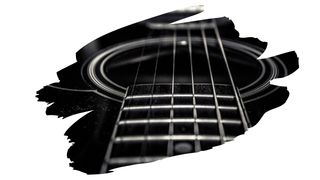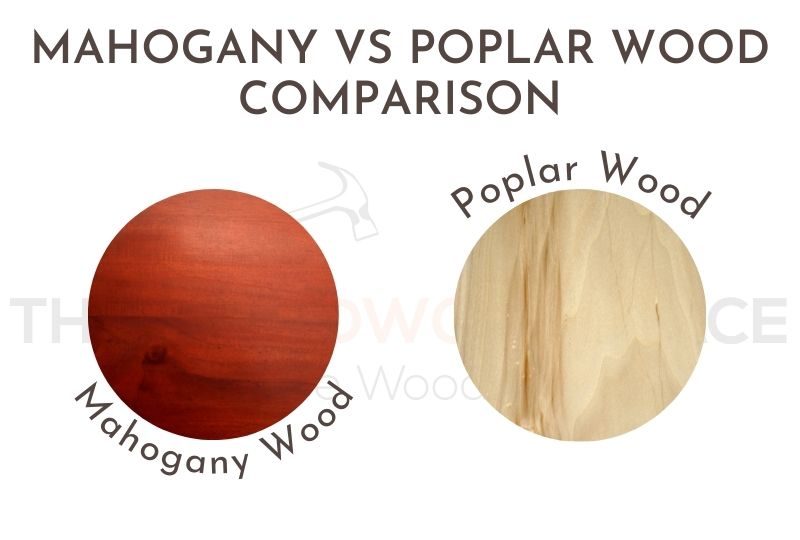If you are looking for a special sound out of your guitar, then Poplar wood is far from a first choice wood.
This bland-sounding timber has a reputation for being relatively unremarkable, both in terms of it’s tonal quality, and in regards to its durability.
In fact, this hardwood is one of the softest ones on the market. And while that may make it easy to machine and work with, it also leaves it vulnerable to being easily damaged.
On the other hand, Mahogany is made of much sturdier stuff. It is denser, stronger and heavier than Poplar wood. And yet none of that can take away from this woods ability to really sell those midrange tones.
But, when we pit these two against each other, who wins out in the battle between Poplar vs Mahogany?

This post may contain affiliate links to products that we receive a commission for (at no additional cost to you). Learn more here.
What Do You Need To Know About Poplar Wood:
Key Features
- Color: Pale Cream.
- Grain: Straight Uniform Grain.
Poplar does not take on penetrating stains/finishes evenly. So the best way to give this timber any color is to use gel stain or to simply paint it.
- Weight: 31 lb/ft³ (510 kg/m³)
- Suitable For: Electric Guitars.
Since this wood type doesn’t have any particularly outstanding tonal qualities to it, it is better used for electric guitars.
Related Post: Should You Use Teak Oil On A Guitar Neck? [Best Practice Revealed]
Is Poplar A Heavy Wood? Or Is It Light Enough For Guitars?
Well, if you are looking for a lightweight guitar body, then Poplar wood should be right up your street.
It is up to 25% lighter than Mahogany. Although, that doesn’t make this one of the lightest lumbers used in guitar manufacturing.
Wood types such as Basswood guitars are even lighter than Poplar.
Poplar Wood Vs Mahogany Weight Comparison: When we compare these two timber types in their average dry weight form, Poplar wood weighs 31 lb/ft³ (510 kg/m³), and Mahogany wood weighs 40 lb/ft³ (640 kg/m³)
Is Poplar A Good Wood For Guitars?
This is a good wood if you are looking for an economical option. But, it’s frequencies are neutral, and its grain is bland. Plus, if you happen to drop it from above-waist height, it’ll break easily.
Still, this lumber costs around 1/3rd the price of Mahogany. That alone is reason enough to use it for your first few guitar builds.
Also, the tonal qualities of wood simply don’t matter as much when it comes to electric guitars, (compared to acoustic ones).

What You Need To Know About Mahogany Wood:
Key Features
- Color: Deep Reddish Brown
And Mahogany’s color will darken further over time too.
- Grain: Straight Grain
- Weight: 40 lb/ft³ (640 kg/m³)
- Suitable For: Acoustic Guitars, Blues/Bass Guitars
Is Mahogany Wood Pretty Expensive?
While it is not the most expensive tonewood on the market, Mahogany is certainly up there. Raw Mahogany wood costs at least twice as much as Poplar wood.
And its price tag is heftier than Poplar’s, mostly due to its rarity.
You see, Poplar trees grow fast, (taking less than 10 years to mature). Which makes this lumber abundant and easy to source.
Mahogany, on the other hand, can take up to a quarter of a century to grow to maturity. This creates the age-old ‘supply and demand’ situation.
In other words, Poplar is cheaper because it is easier to source.
How Good Is Mahogany Wood In General?
For acoustic guitars, this timber will give you a clear and punchy sound when playing those midranges. Which is exactly what you need if you are looking for a fingerstyle guitar.
But, Aren’t Mahogany Guitars Very Heavy?
Dry mahogany wood is a heavy dense lumber in its sold-by-the-board form. However, once it’s been crafted into a hallow instrument, a lot of that density gets taken out of it.
Simple fact is, as long as you aren’t playing a solid Mahogany instrument, the weight difference is almost negligible.
In which case, compared to Poplar guitars, Mahogany guitars are heavier. But Mahogany guitars are by no means hefty, cumbersome instruments either.
Related Post: Why Should You Use Sapele (Vs Maple) For Your Guitar Fretboard?
So To Sum Up…
Your style of play and the type of guitar you want to build, are the real deciding factors when it boils down to comparing these two types of timber:
- If you want an affordable guitar: Go with Poplar. It is much cheaper than Mahogany by far.
- If you want to build an electric guitar: Either wood type will do. Although Mahogany is more durable and will last longer if you routinely practice on it everyday.
- If you want to an acoustic guitar: Go with Mahogany. The sound this wood produces is worth the price.


